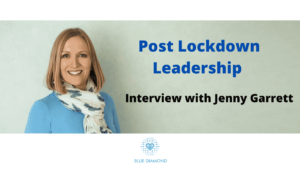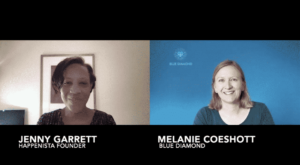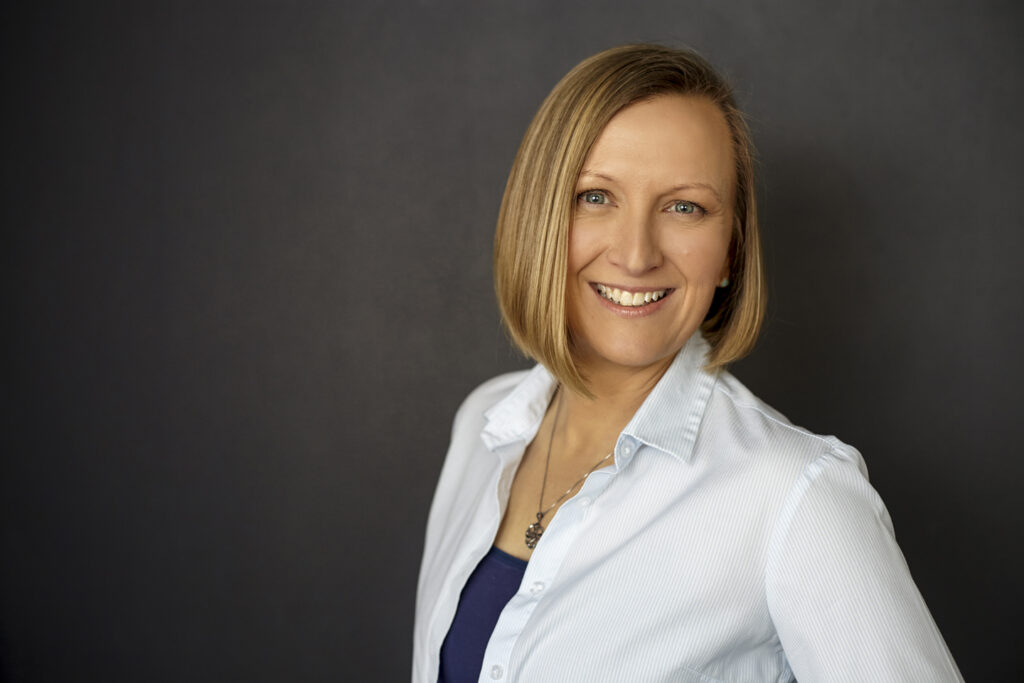
This interview with Jenny Garrett forms part of the Blue Diamond Post Lockdown Leadership Review.
We discuss what great leadership looks like, and how to practice self-leadership and leadership traits for career success.
In addition, we look at anticipated changes in working practices and key skills for success in the post-lockdown economy.
Watch the interview with Jenny Garrett here

Melanie Coeshott (MC) – Good morning, Jenny.
This morning I’m welcoming Jenny Garrett from Happenista, Jenny Garrett Global, and many other things to discuss leadership. Jenny has been very inspirational on my own journey over the last three and a half to four years, so I thought she would be a great person to talk to you about this. Welcome, Jenny.
Jenny Garret (JG) – Thank you for inviting me, Melanie. I’m really happy to be here to grace your stage.
MC – Obviously, you’ve come into contact with lots of different leaders and you run leadership development programs yourself.
What does great leadership look like to you?
JC – Oh, that’s such a big question, isn’t it, what great leadership looks like?
I think at the moment, in COVID-19 times, great leadership looks like compassionate leadership.
It looks like someone who takes the time to care about other people, to think about what they need, and to not push for results at the expense of humanity or human elements. I think it means being human with other people. I think we’ve really seen a different time now where people like Jacinda Ardern from New Zealand have risen to the top as the sort of leadership that we would want to amplify and someone who exemplifies what good leadership looks like.
Maybe it’s a little bit more of what people would call feminine leadership. It’s all about those softer elements that sometimes people don’t think are that important but are hugely necessary.
MC – Great. I can really feel some of that power, that feminine power as you say, that can be so useful at this time.
What do you interpret by the term self-leadership and how do you practice this?
JG – It’s such a good question because we always think about leadership outside ourselves. We think about ‘those leaders’, not us.
I think it’s where it all starts. If you want to be a good leader, then you have to become much more self-aware.
- You have to think about your own values and what you stand for.
- You have to think about the legacy that you want to leave as a leader.
It all starts with self and you have to know who you are and know what you’re about, and actually inspire yourself, to be the person that you would like to follow.
A few years ago, I did a video with a filmmaker, Nic Askew, based in America. I didn’t name the video, but he did. He named it, “Would You Follow You?”.
I think if you’re thinking about self-leadership, that’s the first question to ask, “Would I follow me?” If I wouldn’t, what work do I need to do on myself to ensure that I would? It all starts with you. It’s about working on yourself. It’s about being the leader that you want to follow and about holding yourself to the same standards that you would hold other people.
MC – Wow, what an awesome question! I’ll definitely be asking myself that later. That’s great. It does need a bit of reflection though. A lot of that self-awareness will be useful there.
I know that a lot of the time nowadays, you run your own business, you’re working with and through others but you’re not necessarily leading a team.
What signs of leadership do you look for in other people?
In people that you admire and people that you work with and through
JG – I think I look for the ability to be vulnerable, the ability to admit mistakes, and be willing to fail in search of being better. It’s okay to fail. It’s okay to be vulnerable. It’s okay to admit you don’t feel confident about something. If you’re doing all of that in the pursuit of being the best you can or doing the best work or helping your clients or your customers in the best way possible. As well as, of course, someone who knows their stuff, someone who wants to move forward and create an impact, it’s that person who’s willing to learn and be vulnerable in the pursuit of learning. Those are the people that I like to be around. People who are willing to say, “I’m a work in progress, and I will grow and develop.”
I think when you create that space to say, “I don’t know it all,” maybe you’ve got an idea, maybe someone else has the answers, but I’m going to work towards getting those answers. I think when you’re in that space, that’s when the best work happens. What you do as well as you distribute the leadership.
I do work with teams who are associates for me on leadership programs, but I know that sometimes they will be the experts on specific areas, whether it’s on program design or a particular leadership intervention. I’m very happy to say, “I distribute the leadership to you in the areas in which you are an expert.” I think that’s what I look for in good leaders.
People, I admire? I really do admire Michelle Obama. I think many people admire her. She went through a lot. She’s willing to be open about the things that she experienced, willing to stand up for what she believes in, but also willing to say, “I don’t always get it right.” I think that’s key.
MC – Now obviously, the world has changed a lot in the last four months or so. I keep saying three months but it’s now four months. These months are rattling by.
What further changes do you anticipate in working practices in the next 12 months and beyond?
JG – It’s highly likely we’ll have a second wave. I’m not sure if we’re going to all move back into business as it was before. I’d be really happy if we didn’t because I think there were lots of changes that needed to happen.
I think people will travel less and use technology more. Initially, everyone was so excited about working online, and we were really energetic about it. I think we’ve actually become a bit fatigued with online calls one after another. I had six yesterday, which was a lot. I think we’re going to be pulling back a little bit. Not everything has to be an online call. Maybe we going to use the phone a bit more, or WhatsApp to have more informal interaction.
The thing about Zoom or whatever you use is that it’s, “Let’s schedule it. Let’s have a call. Let’s book it in for 15 minutes.” What we’re not getting is those water-cooler chats, those five minutes. “Oh, I just bumped into you on my way somewhere else.” I think finding a way to have that informality is something that I think we’re going to seek and hopefully find. I think we’ll still work from home a lot more if that’s possible for us. But, I think we’ll have more informal interactions and find ways to do that using technology.
I also think there’s going to be an increase in regionalization. I’m based in Hertfordshire. I’ve spent a lot more time in Hertfordshire than I probably have for a number of years. You get to know your community more, and you care more about your community as a result.
I think there’s going to be an increase in regionalization but also the advancement of technology.
I think there are going to be leaps and bounds in terms of using artificial intelligence in our work. That’s how I see it. Less traveling, more local, more online, but also an appreciation of when we do have face-to-face interactions, a really an appreciation of that, that perhaps we took for granted previously.
MC – Great – talking about Artificial Intelligence and personal interaction, some really great points there. We’ll be getting our crystal balls out and having another look in the future as well, I’m sure.
How will you manage yourself and others through this change?
JG – I think boundaries are key right now. With people who are lucky enough to be able to work from home, it’s a bit of a blessing and a curse because you can wake up, be in your pyjamas, and go straight to your computer. If nothing’s stopping you, if you live alone for example, or you don’t have too many other commitments, you could work into the night. That boundary of closing an office door or walking out of a building and going into another one, you don’t have. Some people don’t have an office room, they might be working from a kitchen table, whatever it is. I think those boundaries around how much work you do and how you work, you have to set them for yourself.
I think this is really important right now because we could quite easily become really exhausted, really burnt out through the work we do.
Actually, what is the work-life balance you desire? How do you want to work? How do you set those for yourself maybe when you’ve been used to your organization setting it for you? How do you manage all of that? It is within your power. I think it’s very important for you to recognize actually “I can turn off my computer at whatever clock it is and walk away from it, and I have permission to do that”.
I think boundaries are key. I think getting some time away from your computer. Actually, putting in your breaks on a regular basis and getting some exercise and some fresh air, and looking away from a screen is really important, as maybe having a bit of a digital detox. Maybe saying one weekend I’m not going to be on social media or maybe I’m going to not watch TV even, just actually give my eyes a rest. I see that as a key thing. These things are about boundaries, about well-being. Those things are really key right now, I think.
MC – Great. Some really important points there, just in terms of, as you say, our well-being and our mental health as well.
What skills do you perceive will be the most important to help us through the next 12 months or so?
To help us through the recession and safely out on the other side?
JG – Good question. I think that resilience is key right now. The ability to bounce forward, not just bounce back, but bounce forward from the life we’re living. They talk about the VUCA world, volatile, uncertain, complex, and ambiguous.
I don’t think that’s going away and as a result, we really need to be resilient to know that there are going to be setbacks on the road, there’s going to be difficulties and so we really need to think about what enables us to bounce forward. Things like emotional intelligence, things like knowing our values, and being purposeful. Things like looking after our physical well-being. Things like knowing what our strengths are and our resources are, and having good relationships as well that we can turn to and get support. I think resilience is really important.
The second thing I would say is adaptability and creativity. The ability you make your plan, but know that actually, you might need plan B, C, D, E, or F because things might change so rapidly that that plan might not go exactly as you want it to, but you’re adaptable to move and change accordingly and that you can come up with some creative approaches to deal with those changes. I think those three things: resilience, adaptability and creativity are the skills we need to get us through.
MC – Thank you, Jenny. Well, wise words as always from you this morning. Thank you very much for sharing your insights and hopefully, we’ll catch up again soon.
JC – Thank you. I wish you so much more success, even more success than you have already. I’ve loved knowing you and watching you grow and develop as an amazing coach and your clients are very lucky to have you.
MC – Oh, thank you. Thank you so much.
Thanks to Jenny Garret OBE, Founder of Reflexion Associates: Leading Women’s Empowerment Speaker, Award Winning Executive Coach, and Leadership Development Specialist.

Thanks for reading. Check out other Blue Diamond articles to help you take control of your work and life.
Check out the other interviews in the Post Lockdown Leadership Review series.

